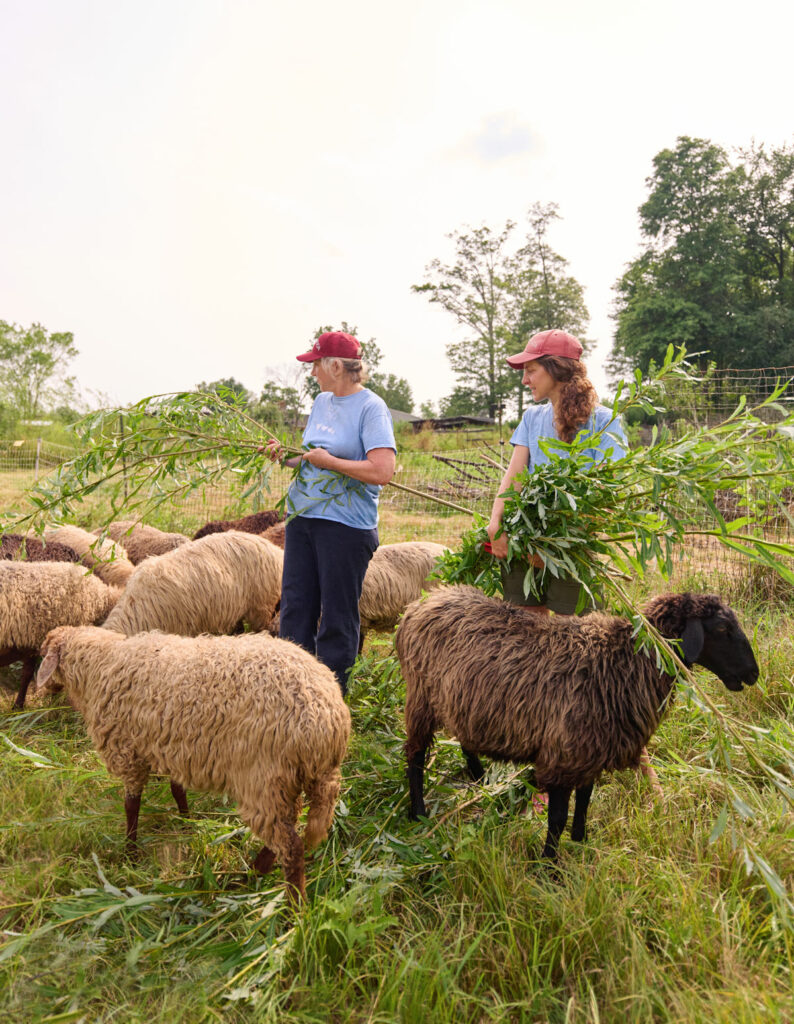PROPRIETORS OF ALL FOR ONE, ONE FOR ALL FARM
Live In: Manhattan and Goshen, NY
Working Toward: Community Prosperity and Global Sustainability
A little over an hour from the hustle and bustle of New York City there exists an oasis in the form of a farm. All for One, One for All—AOOA for short—is a roughly 15-acre nonprofit agricultural enterprise in Goshen that showcases regenerative silvopasture practices (the farming done on AOOA ameliorates the soil and the land’s biodiversity, and trees and shrubs are tended on the same plots as crops and animals). The farm features a distillery producing spirits, brandies, and French-inspired “cremes”—liqueurs that, at 30% ABV, are a bit stronger than most cordials. AOOA also offers a farm stand vending fresh produce, eggs, honey, berries, tea, flowers, and wool in addition to prepared dishes made with the day’s harvest. That’s not to mention workshops, tours, and other events held at the farm.
Behind it all is a mother-daughter duo with deep connections to the land, the food world, and to each other. Ariane and Alix Daguin founded AOOA in 2021. Ariane has had a long career, most notably as the tireless founder of D’Artagnan, purveyor of ultra-high-quality meats, charcuterie, and a wide spectrum of imported French delicacies. Alix studied hospitality at Cornell’s hotel school and also earned a license in architecture, both fields that inform how she runs the farmstead.
Like Dumas’s musketeer, D’Artagnan (for whom her company is named), Ariane is from Gascony, a region in the southwest of France known for foie gras, Armagnac, and rustic cuisine (think daube and cassoulet). She’s a seventh-generation food careerist; her father, André Daguin, was chef/owner of the Hotel de France in Auch, Gascony, and was famous throughout France for his foie gras. Though raised in his kitchen, Ariane knew that her father’s restaurant would go to her brother because he was a man. Not wanting to just become somebody’s wife—and looking beyond the world of food—Ariane left for the United States to study political science, intending to become a journalist. While in New York, she saw an opportunity to build a business selling and promoting foie gras, and the rest is D’Artagnan’s history. Asked whether she faced challenges as a female food-business entrepreneur, she is characteristically resolute: “I think the French card trumped the woman card. A French accent gave you authenticity in the culinary world. Because you’re French, you’re supposed to know better.”
RELATED | Taste France: Délicieux!

Alix was raised in NYC but often spent time with her grandparents in Gascony. “Seeing those two different cultural relationships that people had with their food—in New York City, when I was middle school there, my friends’ lunches were chicken nuggets; they didn’t look like chicken thighs!” Alix says. “But then I went to the south of France, to a small village that still has a market twice a week—one uptown, one downtown—where people buy their food, and it’s real, and it has dirt on it, and of course, sometimes it’s alive. I think that’s when I got this obsession, thinking in my head about our relationship with food: How can we make better decisions about it, how can we be more connected to where it’s from?”
If those questions drove Alix toward the food world, another set of questions inform operations at the farm. “How do we do our best to promote responsible agricultural and culinary practices as transformative tools?” Alix asks. “Do we do this with more fun workshops? Do we do this with a bigger you-pick? Do we do this with crazy culinary workshops?”
“A French accent gave you authenticity in the culinary world. Because you’re French, you’re supposed to know better.”
Ariane and Alix bring different sensibilities to those questions. Alix loves the cultivating, the animal husbandry, the environmental stewardship of the acres that make up the farm. Ariane enjoys seeing the effects: She loves to “feed people real, good eggs from happy chickens, or some carrot cake or fava bean salad made from vegetables picked an hour before,” and see “people discovering for the first time and being happy about something gastronomic,” she says.
I ask Alix and Ariane whether it’s difficult to work so closely with a family member, a question that brings laughter from both. “At the end of the day, she’s my mom and I’m her daughter,” Alix says. “We’re gonna show up. I can’t trust anybody else like I would trust her.”



